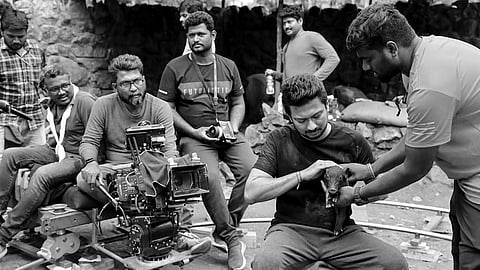
As India celebrates its 77th Independence Day, the nation reflects on the journey towards freedom, justice, and equality. While the struggle for independence from colonial rule laid the foundation for a sovereign nation, it's important to recognize that true independence is an ongoing pursuit for every citizen. Despite the progress made, individuals from marginalized sections continue to face entrenched forms of oppression and discrimination across various states. For them, the fight for genuine independence remains a steadfast endeavour, reminding us that the journey towards a truly equal and inclusive society is far from over.
Just as citizens from marginalized sections continue their struggle against oppression across various states, the characters in the Tamil blockbuster "Maamannan" embody the relentless fight against injustice. Delving into the intricate tapestry of caste politics, reservation systems and societal inequalities, "Maamannan" emerges as a significant cinematic exploration of these pressing themes. Since its release on July 27th, the movie has been gaining significant attention on Netflix, captivating audiences with its thought-provoking themes and symbolic storytelling. Directed by Mari Selvaraj, the film delves into the harsh realities of caste discrimination and uses animal symbolism to shed light on social hierarchies. The narrative revolves around the central character 'Maamannan', portrayed by the iconic Vadivelu, and his son Veera, played by Udhayanidhi Stalin. Fahadh Faasil's portrayal as Rathnavelu is compelling. A.R Rehman's music is a big hit.
The film opens with a chilling incident where upper-caste individuals stone and drown children from the lower community while they bathe in a village pond. This tragic event sets the tone for the movie's exploration of caste-based discrimination and hatred towards marginalized communities. The movie effectively showcases the enduring impact of such incidents on individuals and communities.
"Maamannan" revolves around Maamannan, an MLA from the Dalit community, who rose through the ranks from being a member of the Samathuva Samooganeedhi Makkal Kazhagam (SSMK) in Tamil Nadu's Salem District. His son, Athiveeran (Veera), practices a martial art form 'Adimurai' and harbors emotional trauma from a casteist attack during his childhood.
Rathnavelu, the SSMK district secretary and son of a dominant community's late minister, becomes a source of conflict due to his brash behavior and aggressive attitude towards Maamannan.
The conflict escalates when Rathnavelu's men destroy a free coaching center run by Veera's friends and love interest, Leela, impacting a private coaching center owned by Rathnavelu's elder brother. Veera retaliates, resulting in a confrontation between the families. Rathnavelu's violent tendencies lead to a physical clash between the families. However, political pressures force Rathnavelu to apologize, or he loses his party membership. Instead, he switches parties and challenges Maamannan in the upcoming elections.
The election becomes a battleground as Rathnavelu uses divisive tactics, exploiting caste divisions. He even resorts to violence, but his plans backfire as youth from the constituency reject his control and manipulate the narrative in Maamannan's favor. Ultimately, Maamannan secures a resounding victory in the elections, becoming the Speaker of the Legislative Assembly. The film concludes with Veera and Leela continuing their grassroots social work, while Rathnavelu's plans fall apart, highlighting the power of collective resistance against caste-based discrimination.
The movie skillfully employs symbolism through animals, specifically dogs and pigs. Rathnavelu, the antagonist, raises aggressive dogs as a reflection of his ego and pride. These dogs are a means to showcase his dominance and superiority, particularly in races. When one of his top dogs loses a race, he callously shoots it to assert his authority.
In contrast, the protagonist Adhiveeran has a deep affection for pigs, treating them as his own family. This is starkly evident when Rathnavelu's dogs attack and kill Adhiveeran's pigs, causing immense devastation. This symbolic contrast highlights the differing attitudes towards animals and reflects the characters' personalities and values.
The movie touches on a powerful theme where lower caste individuals are often used as tools by political leaders. Although they might appear to share close relationships, these connections are more about gaining favor rather than genuine affection. This concept is evident in the film, where Maamannan finds it difficult to confront Rathnavelu, the youth he had raised since childhood, even lacking the confidence to sit before him, showcasing the complex power dynamics at play.
Similar to Selvaraj's debut film, "Pariyerum Perumal," "Maamannan" is optimistic and believes change can happen through democratic means.
The film's release has sparked important conversations about caste discrimination, symbolism, and social inequality. Audiences are praising the movie's impactful storytelling, strong performances, and its ability to shed light on uncomfortable yet crucial topics. "Maamannan" stands as a reminder of the importance of addressing and confronting societal issues through the medium of cinema, making it a must-watch for those interested in thought-provoking narratives that challenge the status quo.
Also Read-
You can also join our WhatsApp group to get premium and selected news of The Mooknayak on WhatsApp. Click here to join the WhatsApp group.